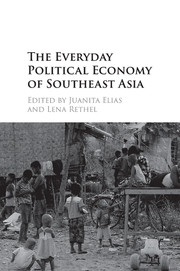Book contents
- Frontmatter
- Epigraph
- Contents
- List of Figures and Map
- List of Tables
- Notes on Contributors
- Acknowledgements
- Part I Introduction
- Part II From Development to Multiple Modernities
- Part III Widening and Deepening Markets
- 5 The Political Economy of Muslim Markets in Singapore
- 6 Islamic Finance in Malaysia: Global Ambitions, Local Realities
- 7 Resisting Marketization: Everyday Actors, Courts and Education Reform in Post–New Order Indonesia
- Part IV People, Mobilities and Work
- Part V Conclusion
- Index
- References
7 - Resisting Marketization: Everyday Actors, Courts and Education Reform in Post–New Order Indonesia
from Part III - Widening and Deepening Markets
Published online by Cambridge University Press: 05 August 2016
- Frontmatter
- Epigraph
- Contents
- List of Figures and Map
- List of Tables
- Notes on Contributors
- Acknowledgements
- Part I Introduction
- Part II From Development to Multiple Modernities
- Part III Widening and Deepening Markets
- 5 The Political Economy of Muslim Markets in Singapore
- 6 Islamic Finance in Malaysia: Global Ambitions, Local Realities
- 7 Resisting Marketization: Everyday Actors, Courts and Education Reform in Post–New Order Indonesia
- Part IV People, Mobilities and Work
- Part V Conclusion
- Index
- References
Summary
Introduction
A key debate in the recent literature on Indonesian politics has centred on the extent to which everyday actors, including citizens from poor and lower–middle-class backgrounds and their allies in the NGO movement, have been able to participate effectively in the policy-making process since the fall of Suharto's authoritarian New Order regime in the late 1990s. On one side of this debate, scholars such as Vedi Hadiz, Richard Robison and Olle Tornquist have argued that policy making in the post–New Order period has remained just as exclusionary as it was under the New Order despite the fact that the country has become more democratic and decentralized (Hadiz 2003, 2010; Hadiz and Robison 2005; Robison and Hadiz 2004; Tornquist et al. 2004). Power relations, they have argued, have simply been reorganized rather than transformed: instead of fading from the scene, the politico-bureaucratic, business and criminal figures who dominated the New Order ‘have been able to reinvent themselves through new alliances and vehicles, much like they have, for example, in parts of Communist Eastern Europe/Central Asia’ (Hadiz 2003: 593). At the same time, they suggest, Suharto's rule left a powerful legacy in relation to the participation of everyday actors in policy making. The New Order's systematic pursuit of a policy of disorganizing civil society and repressing any form of political activity on the part of opposition groups, they suggest, has ‘effectively paralyz[ed] most independent capacity for self-organization among groups like the urban middle class and the working class’ (Hadiz and Robison 2005: 232).
On the other side of this debate, scholars such as Hans Antlov, Marcus Mietzner, Ed Aspinall and myself have argued that democratization and decentralization have opened up new opportunities for everyday actors to influence policy-making, resulting in a slightly more inclusive political system. For instance, in a paper co-authored with Kurnya Roesad and Donni Edwin (Rosser et al. 2005), I argued that the shift to a more democratic political regime has (i) removed key obstacles to organization by poor and disadvantaged groups and NGO activists, making it easier for them to engage in collective action aimed at achieving pro-poor change; and (ii) created an electoral incentive for politicians to promote policy changes that benefit these groups or at least appeal to them.
- Type
- Chapter
- Information
- The Everyday Political Economy of Southeast Asia , pp. 137 - 156Publisher: Cambridge University PressPrint publication year: 2016

